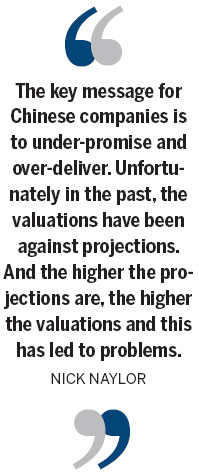Allenby sees the tide turning
Updated: 2012-06-15 12:28
By Cecily Liu (China Daily)
|
|||||||||||
|
Nick Naylor (left), chief executive of Allenby, and Matt Butlin, head of research at Allenby, which advises four Chinese companies listed on the AIM in London. Provided to China Daily |
London brokerage sees more quality Chinese firms on alternative market
Though accounting problems and profit warnings have somewhat derailed the pipeline of initial public offerings by Chinese companies on global bourses, many leading fund managers are optimistic that the current situation is a temporary blip as China's economic indicators are still robust.
Allenby Capital, the nominated adviser and broker for four Chinese companies that are currently traded on the Alternative Investment Market (AIM) in London, says it expects more Chinese companies to float their shares on the exchange this year.
"It is very hard for fund managers in the UK to find earnings growth by just investing in the UK and European companies over the next few years. An alternative is to invest in Asian stocks," says Matt Butlin, head of research at Allenby.
To help investors better understand Asian equities, Allenby publishes a quarterly analysis of the AIM-listed companies that are largely focused on Asia. The report incorporates various aspects such as new listings, the top traded stocks, secondary fund raising, and sector breakdown of these companies.
Though the IPO pipeline has not mushroomed as anticipated, fund managers like Allenby are optimistic that the situation will ease soon. Till date, three Chinese companies have sought AIM listing this year, compared with just two for the whole last year. But it is still a far cry from the 34 Chinese companies that sought AIM listing in 2006.
 |
Nick Naylor, the chief executive of Allenby, admits that Chinese companies have suffered due to negative vibes and bad press after some Chinese companies faced listing, accounting and funding problems on US bourses.
Shares of Chinese forestry company Sino-Forest, listed on the Toronto Stock Exchange, have been suspended from trading since August last year, after allegations of fraud.
More recently Dongfang Shipbuilding, an AIM-listed manufacturer of medium-sized vessels from Wenzhou, Zhejiang province, ran into trouble after its chief operating officer resigned and orders tumbled. In March, the company's nominated adviser Northland Capital Partners resigned, and subsequently its shares were suspended from trading.
The disappointing performance of Anthony Bolton's China Special Situations fund has also played a key role in drumming up negative sentiment toward Chinese companies in London. Once nick-named the "City's Silent Assassin" for his extraordinary stock picking skills, Bolton moved to Hong Kong in 2010 to run the 460-million-pound ($710 million, 570 million euros) fund, which invests largely in Chinese stocks.
Contrary to expectations, the fund's net asset value dropped by 28.9 percent in the six months to September 30, 2011, against a drop in the benchmark MSCI China Index of 24.5 percent during the same period. The fund's share price fell by 31 percent.
Although Bolton says he is still confident about China, many London fund managers are not so sure.
Naylor, however, says that high growth projections alone do not translate into high valuations for foreign-listed Chinese companies.
"The key message for Chinese companies is to under-promise and over-deliver. Unfortunately in the past, the valuations have been against projections. And the higher the projections are, the higher the valuations and this has led to problems," Naylor says.
Butlin says that new floats must have a reasonable size, profitability and a strong management, to "even get through the front door" of fund managers.
More importantly, sound corporate governance measures need to be implemented regularly and consistently. "Corporate governance is not just a set of rules, but a state of mind," Naylor says.
Implementing corporate governance measures such as appointing English-speaking non-executives and setting up audit and remuneration committees were common problems associated with most of the AIM-listed Chinese companies.
But Naylor says that the enforcement of such measures is more consistent and regular for new floats now.
Illustrating this, he says that high standard corporate governance could mean appointing non-executives who already have the experience of acting in public companies and who are "prepared to stand up, and say their piece".
The English-speaking non-executives of the company should also have a good grasp of Chinese, or have advisers that sit alongside them to give them a proper overview of the conversations that happen at board meetings.
"In the past, there was too much that was taken on trust. There may be a document that says it is a license, but in fact it is something completely different," he says.
Naylor says that it is important for nominated advisers to ensure that the listing company has a strong board in place. If they do not, it would be better for them to drop the listing plans, he says. Similarly, if the nominated adviser feels uncomfortable with the team of auditors, accountants and lawyers the client has selected, they should insist on changes.
Although most fund managers generally meet the CEO, the finance director and possibly the chairman, Naylor says that he would be more than happy to introduce them to every single board member of his client if requested.
Global Lock Safety International Group, a Shenzhen-based provider of security services to retailers, was the first Chinese company that used Allenby's services for an AIM listing.
Naylor and Butlin visited Global Lock in July 2010, and spent two days at the company's Shenzhen headquarters and another two days in Hunan province, where many of Global Lock's subsidiaries are located. Three months later, in October 2010, Global Lock raised 2 million pounds through a private placement on the AIM.
Since then, Naylor has visited China three times, and Butlin four times to meet different clients, including the Shenzhen-based lighting manufacturer LED International Holdings and the Hong Kong-based provider of CCTV security solutions Univision Engineering.
Allenby's most recent float is Money Swap, a Hong Kong supplier of foreign exchange payment systems, which raised $5 million last August through a private placement.
Naylor says that the key purpose of visiting clients prior to their London listing is to meet the company in its own office environment. After the IPO, Allenby visits each client at least once a year, perhaps by attending a board meeting to show its support and remind the company of its obligations to the investors on AIM.
As a broker, Allenby also oversees the trading of its clients' stocks, does research on the companies' activities, and charts forecasts based on equity research reports.
This February, it released a report on Univision Engineering, suggesting that a share price re-rating was due. At that time, Univision Engineering's share price was 0.4 pence per share, but the report argued that 1.9 pence was more of a fair value.
Allenby argued that the prior low valuation of the company was a result of litigation costs, rising debt levels, and cash tied up in illiquid assets. But the first two issues are already resolved. "In the few days surrounding the report, we saw a pick-up in liquidity, and some of the bulletin boards discussing the research," Butlin saiys.
Share prices peaked to 0.6 pence in late February and early March. Univision also became the "top riser" among Chinese companies on the AIM in February, according to a research report by consultancy Agile Partners.
Globally, the investor confidence in Chinese companies is still at a low. The AIM regulators have also asked the nominated advisers to step up due diligence on prospective Chinese companies seeking an AIM listing. The authorities have sought due diligence reports in Chinese and English along with an independent verification report from a third party in the Chinese jurisdiction.
Naylor says that such instructions give the impression that "we AIM do not like Chinese companies, and we do not want to list them". It could also give the impression that "we think care needs to be taken with Chinese companies".
But he says that ultimately what is important is what the market wants and that is for "quality Chinese companies to list on the AIM".
cecily.liu@chinadaily.com.cn
(China Daily 06/15/2012 page6)
Today's Top News
Rescuers race against time for quake victims
Telecom workers restore links
Coal mine blast kills 18 in Jilin
Intl scholarship puts China on the map
More bird flu patients discharged
Gold loses sheen, but still a safe bet
US 'turns blind eye to human rights'
Telecom workers restore links
Hot Topics
Lunar probe , China growth forecasts, Emission rules get tougher, China seen through 'colored lens', International board,
Editor's Picks

|

|

|

|

|

|






